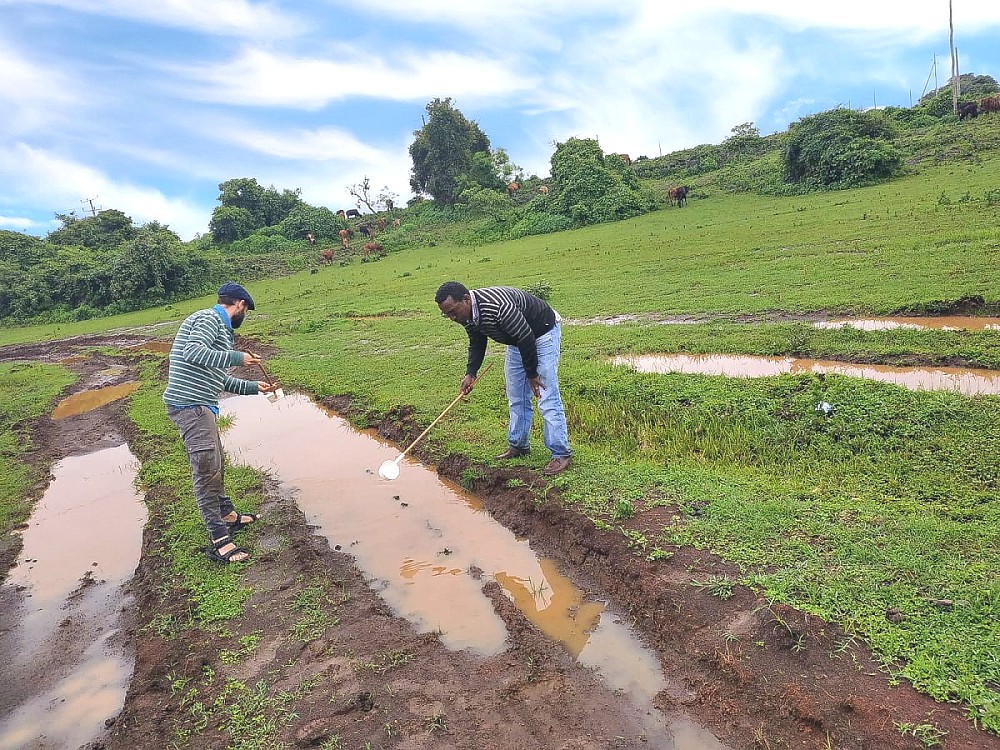ZzappMalaria, a Jerusalem-based start-up focused on eliminating Malaria using AI and other Tech-tools, has won first place in the IBM Watson AI XPRIZE Competition, nabbing a $3 Million grade prize, as well as the People’s Choice Award as the “Most Inspiring Team.”
First launched in 2016, the AI XPRIZE challenge, sponsored by IBM Watson, looked to recognize initiatives tapping artificial intelligence (AI) to tackle some of humanity’s most pressing challenges in areas such as Healthcare, Education, Global Development, and Exploration.
ZzappMalaria was selected as one of three finalists for the prize earlier this year out of a pool of 10 semi-finalists following presentations of their solutions to a panel of judges during an event held at TED headquarters in New York City last year.
A field worker uses ZzappMalaria to scan bodies of water set for treatment. Courtesy
The winners were announced on Wednesday night in Los Angeles, with ZzappMalaria nabbing the top spot. “The Zzapp team is deeply grateful to Xprize and IBM Watson for acknowledging the importance of the fight against Malaria,” said Arnon Houri-Yafin, CEO and Founder of ZzappMalaria, in a statement. “We will dedicate the prize money to one ambitious goal: Demonstrating that rapid Malaria elimination is possible in Sub-Saharan Africa.”
Anousheh Ansari, CEO of XPRIZE, said: “After five years of hard work and dedication, XPRIZE is thrilled to announce Zzapp Malaria as the grand prize winner of IBM Watson AI XPRIZE. We are looking forward to seeing firsthand the positive impact they will have on our future.”
How ZzappMalaria fights the disease
ZzappMalaria was established five years ago as a spin-off company of Sight Diagnostics, the developer of lab-grade blood testing systems with results in minutes. Sight’s first product, Parasight, was deployed in African countries and India in 2014 to detect Malaria in the blood.
In 2016, Houri-Yafin, formerly with Sight, founded ZzappMalaria to tackle the mosquito-borne, potentially fatal infectious disease on the eradication level, specifically in developing countries. Nearly half of the world’s population is at risk of contracting Malaria, the disease transmitted by female Anopheles mosquitoes infected by the Plasmodium falciparum parasite.
ZzappMalaria taps AI to identify malaria hotspots and works to eliminate risk. Courtesy
According to the World Health Organization (WHO), there were an estimated 229 million cases of Malaria worldwide in 2019, with children under five years in the most vulnerable group affected by the disease. Young children accounted for 67 percent (274,000) of all Malaria deaths (409,000) worldwide in 2019. Houri-Yafin told NoCamels in February that he saw the devastating toll of the preventable and curable disease up close when he was working with Sight years ago.
ZzappMalaria’s approach is through larviciding – targeting the breeding sites of the mosquitoes. The company built an AI-powered, map-based app that helps predict where stagnant water bodies (caused by rain) will occur and guides field workers to manage treatment through pesticides.
The app is adapted for low-connectivity environments and works on simple, low-cost phones common in developing countries. The technology achieves three things, Houri-Yafin explains. ZzappMalaria helps map affected areas and uses topographical analysis to determine the formation of bodies of water where mosquitos may breed. The mobile app then helps professionals on the ground scan the fields, find these bodies of water, and upload them to the system so that the fieldwork spraying team and go in and apply treatment.
An Anopheles stephensi mosquito shortly after obtaining blood from a human (the droplet of blood is expelled as a surplus). This mosquito is a vector of malaria, and mosquito control is an effective way of reducing its incidence. Photo: Jim Gathany via the Centers for Disease Control and Prevention’s Public Health Image Library (PHIL), with identification number #5814, Public Domain
“This process was often done with workers simply going around and trying to find these bodies of water, and they often couldn’t find all of them. We wanted to systemize this work,” Houri-Yafin told NoCamels.
ZzappMalaria’s technology, he explained, “is a combination of planning tools – mapping, weather analysis, and so on – and workflow management” and it provides an effective, tailored solution for planning, coordinating and tracking larviciding operations.
The vision is ambitious. ZzappMalaria is working toward the full eradication of malaria rather than the management of the disease – a strategy currently applied in many developing countries, said Houri-Yafin.
“We want to see a more aggressive approach, an eradication of malaria, similar to what countries like Israel, Greece, Spain, and so on did years ago,” he indicated.
ZzappMalaria is running antimalarial in Ghana, Ethiopia, Tanzania and Zanzibar, with local partners such as municipalities, foundations, workplaces such as gold mines, and NGOs.
By NoCamels Team

